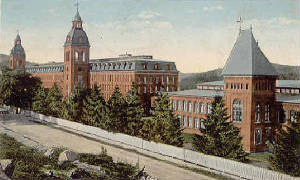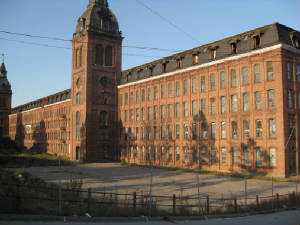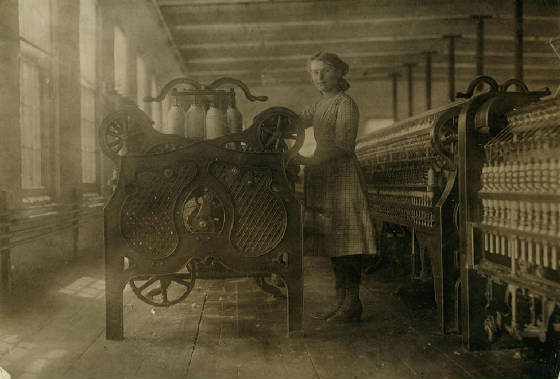
Lewis Hine caption: Annie Dugas, spinner at machine on top floor of Glenallen Mill. Location: Winchendon, Massachusetts, September 1911.
“I knew that she had worked in a mill, but there was no face to it until now. It’s hard to see an older person as a child, especially your mother. Now I look at her and think, ‘Oh, you were once that young, and you had to work very hard.” -Sharon Mozden, daughter of Anna Dugas

Lewis Hine caption: On left is Anna Pagnette; said 12 yrs. old, has been helping sister in Glenallen Mill all summer. On right is Alice Dugas; said 11 years old and helps sister Annie spin Glenallen Mill. Annie said, “She helps me quite a lot.” Location: Winchendon, Massachusetts, September 1911.
“She loved people. We left a car for her outside her apartment, even when she couldn’t drive anymore, so she could go down and sit in the car in the sun and talk to anyone who walked by. And that’s what she did.” -Fred Gale, son of Alice Dugas
**************************
Looking at these photos of Anna and Alice, knowing what I know now, it is stunning to realize that Anna was destined to live another 80 years, and Alice another 87 years.
Odilon and Emma (Fortin) Dugas and their eight children left Quebec in 1907, and moved to Winchendon to work at the Glenallan Mill. Four years later, two of their children, Anna and Alice, were photographed by Lewis Hine. Anna was one of only two child laborers who were photographed inside the Glenallan Mill. Being an unwelcome investigator, Hine would have had to sneak up the winding stairs in the tower to reach the third floor, and it’s likely that he was chased out soon by management. Alice was photographed on a Sunday, obviously dressed for church.

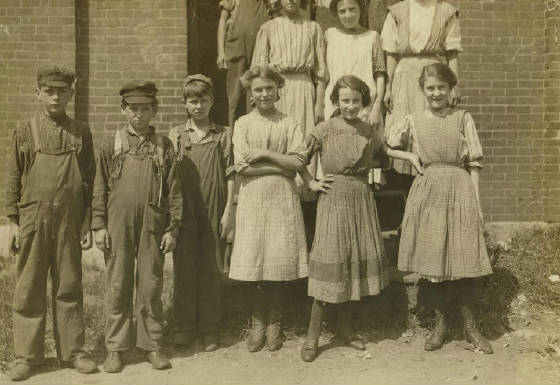
Lewis Hine caption: Group of Workers in Glenallen Mill, including Adrienne Pagnette, Annie Dugas, Francis Pagnette, Anatole Gernon, apparently 11 or 12 years old, doffs on top floor spinning room of the above mill. Speaks no English. Location: Winchendon, Massachusetts, September 1911.
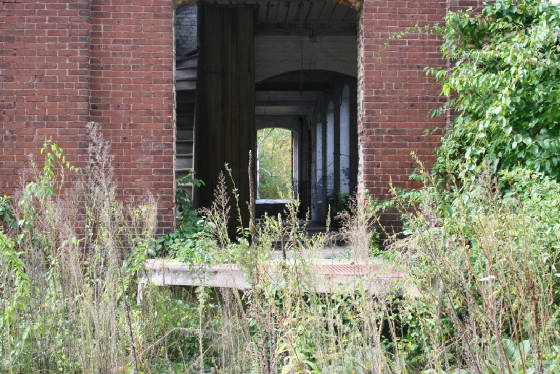
Anna was born on August 26, 1897, possibly the first child of her parents, who were married in 1896. In the 1910 census, the family was listed as living at 56 Glenallan Street, just a short walk from the mill. In 1914, the family left Winchendon and moved to the Taftville section of Norwich, Connecticut, and went to work at Ponemah Mills.
Known initially as the Taftville Cotton Mill, most of its original workers were Irish immigrants. During the Panic of 1873, unemployment rose and wages dropped, causing a contentious relationship between workers and management, and finally a strike. In response, the company cut wages even further and told the workers that wages would be restored if they agreed not to join a union. Eventually the company replaced the workers with French Canadians. At one point, the village was more than 70% French Canadian.
In 1917, Anna married Mathias Paradis, then a fellow worker at Ponemah Mills. Her father died in 1947, and her mother died in 1951. Mathias died in February of 1977, at the age of 80. Anna died on January 19, 1992, at the age of 94. They had five children. The youngest, Sharon Mozden, was adopted. When I contacted her, she told me she had never seen the Hine photos of her mother.
Alice Dugas was born on April 8, 1900. She married Julian Gale in 1923, and they had three children. Julian died in 1960. Alice Dugas Gale died on November 28, 1998, at the age of 98. I found her son, Fred Gale, who lives near Norwich. He was also unaware of the Hine photos.
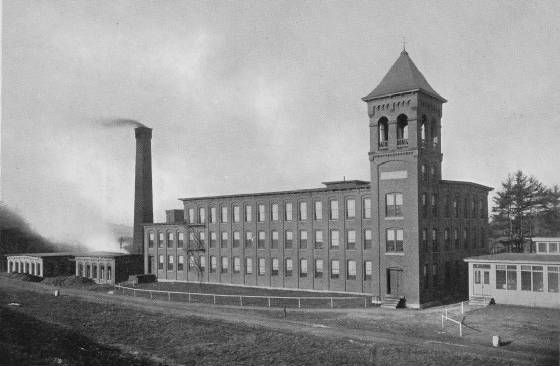
Edited interview with Sharon Mozden, daughter of Anna Dugas. Conducted by Joe Manning (JM), on April 7, 2009. Transcribed by Hilary Buxton and edited by Manning.
JM: How did you react when you first saw the photos of your mother?
Mozden: Oh, my gosh, I can’t even begin to tell you. It was very emotional for me. I have no pictures of my mother as a young girl, so they are very precious. She and her husband adopted me when I was about five years old. They had four children of their own. One of their daughters, Claire, had adopted me when I was about nine months old. I was born in Hartford (Connecticut) in 1948. I had been in an orphanage called St. Agnes Home. My real parents were Greek, but I have almost no information about them. My mother told me that I was the last of seven children, and that they couldn’t afford to keep me.
But several years after Claire adopted me, her husband was killed. Unlike today, where almost anyone can adopt a child, the rules were different. The State of Connecticut said she wasn’t allowed to keep me, since she was a single parent. So the state decided to take me back, but Anna said no, and that she and her husband wanted to adopt me. So I went from calling Anna my memere to calling her Mom.
JM: What kind of relationship did you have with Claire after that?
Mozden: It was a good relationship. Claire lived just down the street from us, so I saw her often. I used to call her Mommy Claire. They had a summer place by a lake, and I remember going there in the summer for a vacation and staying for a week or so. Unfortunately, she died when I was in high school. She had a massive heart attack.
JM: Did you recognize your mother in the pictures?
Mozden: When I put them up on the computer, my husband said, ‘Oh, my gosh, it’s your mom.’ You know who she reminds me of? She reminds me of her oldest granddaughter. I got them framed, and now they are absolutely stunning. She would be so flattered and humbled if she could see them. They are like a museum piece. The framer was so enamored with the picture of her in the mill that I made a copy for him, and he wanted to ask his manager if he could hang it in the shop. I hung the pictures in our den; it’s the perfect place for them.
JM: Where did you live when you were growing up?
Mozden: In Taftville, which is a little section of Norwich.
JM: What was your mother like when you first started living with her as an adopted child?
Mozden: She was a very loving person, but she was never overtly affectionate. The very first time she ever called me sweetheart was when my son was born; but she was very loving, caring, generous, unselfish, and very humble.
JM: Were her other children still living in the home when you were growing up?
Mozden: No. By the time I was adopted, my parents were in their 50s, and I was the only child at home.
JM: As you grew older and your parents were old enough to be grandparents, how did that affect you in terms of comparing yourself to other children of your age who had younger and more active parents?
Mozden: Back then the families all lived on the same block, and I had a cousin in the neighborhood whose parents were much younger. I went to the beach with them, but I never went to the beach with my parents. My mother never wore pants; she always wore a dress. When she went to church she always had a hat and gloves.
JM: How did your mother treat the situation of you having a different biological mother?
Mozden: That was never brought up.
JM: But when you were five, you must have been old enough to realize this was going on?
Mozden: Well, they told me that I was very special. That’s how they handled it.
JM: But you knew you were adopted?
Mozden: Yes, they didn’t hide that.
JM: When you were growing up, did your mother work?
Mozden: No. I think she worked for a little while when she was first married, but after that, she was always home. I went to a small Catholic grammar school. I’d walk home, she’d have lunch, and then I’d walk back to school.
JM: Did your mother talk much about growing up in Winchendon, or growing up as a child and working in a mill?
Mozden: She talked a little bit about it. I think now about what they had to do if you had a large family. I don’t think she even finished grade school. Neither she nor her sister Alice graduated from high school. I went to nursing school, and I was one of the first to go beyond high school.
JM: Have you ever been to Winchendon?
Mozden: I don’t think so. I think she might have gone back to visit there when she was first married, but I’ve never been there.
JM: Could your mother read and write?
Mozden: Oh, yes.
JM: Did your mother speak French when you were little?
Mozden: Yes. When she got together with her family, she would speak French.
JM: What did your father do for a living?
Mozden: He was a custodian in a couple of the local schools. They never had a lot of money, but we always had what we needed.
JM: My records indicate he died in 1977.
Mozden: He died the year before my son was born. He loved children. I remember my mother saying, ‘It’s too bad Daddy is not here; he would have loved this.’
JM: He died 15 years before your mother died.
Mozden: That’s right. She was 94 when she died. She had finally gone into elderly housing, the last year or two, and then the last six months or so, she was in a nursing home.
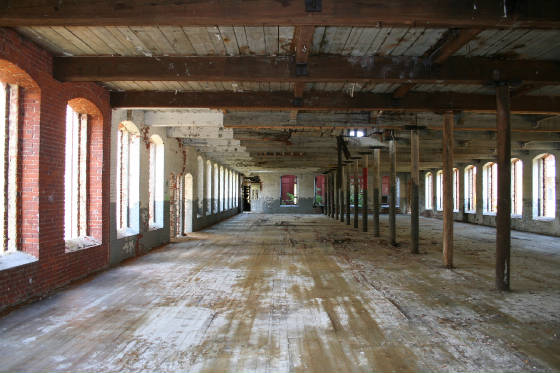
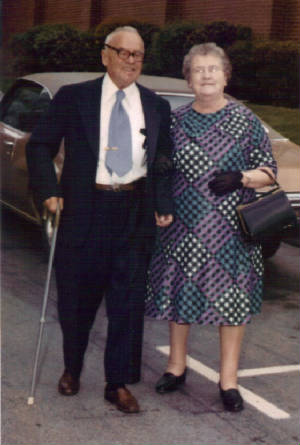
JM: Did you live in the same house the whole time you were growing up?
Mozden: Yes. It was at 54 Merchant Avenue.
JM: Is the house still there?
Mozden: Yes.
JM: Was it a French-Canadian neighborhood?
Mozden: Absolutely. And a lot of people worked at the mill.
JM: Was the house a single family house?
Mozden: It was a three-family house. We lived on the top floor. You know who owned the house? Alice, my mother’s sister, the other little girl in the pictures.
JM: But she did not live in it?
Mozden: No, she didn’t. But for a while, her youngest son lived there with his family.
JM: Are any of your mother’s older children still living?
Mozden: Yes, one son is still alive. The other two sons and one daughter have passed away. You know, my mother was the glue that held the fabric of our family together. She was always the peacemaker. She never wanted there to be any waves; she always wanted things to be smooth. We used to go to Mass on Sunday, and then we’d all meet at her house. But when she died, things just kind of fell apart. I think of her so often on Fridays during Lent, because on Friday, she used to make the best chowder, and she’d make her own fritters. She had a tiny little kitchen. It would just amaze me how in the summer she’d do all this cooking, and I’d say, ‘Mom, aren’t you hot?’
JM: Did she also cook French?
Mozden: Yes. Simple things like meat pies.
JM: When you moved out, did she continue to live in the same house for a while?
Mozden: She lived there for a few years after my father died. But as she got older, we thought it might be a better idea if she went to an elderly housing apartment. We felt she would be safer there, and we urged her to go. Her neighborhood had changed. When she was younger, she knew the family that lived next door, and her brother lived next door. Then everybody started moving, and she was kind of there by herself. She had to walk up two flights of stairs. We were concerned about that. The move worked out well, and she didn’t seem to mind because there were activities there, and her friends were there, although they slowly started to die, because they were all the same age.
JM: What do you do for a living?
Mozden: I’m a nurse. I work at the local hospital.
JM: Have you done that for a long time?
Mozden: Almost 40 years. I just love it.
JM: And you’ve lived all your life in the Norwich area?
Mozden: Yes.
JM: How many children do you have?
Mozden: I have one son.
JM: And what does he think about the pictures?
Mozden: He loves them.
JM: Would he have known your mother well?
Mozden: Yes. She used to babysit for him. She came to his parties.
JM: What kinds of things did you enjoy doing with your mother?
Mozden: We shopped a lot. She loved to go out to lunch, especially after my dad died, because she was alone and she didn’t like to cook for herself. When I would call her and ask her to go to lunch with me, she would always say, ‘Give me 10 minutes, and I’ll be ready to go.’
JM: What kind of a relationship did she have with her sister Alice?
Mozden: They were very close.
JM: What was your father like?
Mozden: He was very quiet, but he had a good sense of humor. He was involved with the volunteer fire department. I have a picture of him that’s in an oval frame. He had a crew cut and reminded me of Spencer Tracy.
JM: What do you think about the fact that Mr. Hine was using your mother’s pictures as examples of child labor?
Mozden: I feel so bad. It hurts to know that she had to do that. She used to say that they all had big families then and everybody worked. I never had to do that. I never had to work when I was that age.
JM: You should visit Winchendon. The town looks like something from another time, and the mill that your mother was photographed in is still there.
Mozden: You’re kidding.
JM: The Glenallan Mill is now gutted out, and it’s a shell of what it was before. Somebody has invested money in an effort to turn it into apartments or condominiums, but it will take a lot of money to do it. You can see it right off Glenallan Street. It’s behind some woods, and a little road goes down to it. It’s a beautiful old mill, but it’s in bad shape. The second floor is buckled and has a hole in it. I went inside the mill and took some photographs. Your mother probably would have worked from early in the morning until late in the afternoon. It would have been hard work, cold in the mill in the winter and hot in the summer. It appears from the picture that she was tending the spinning machines. She would have worked a short distance from home, and lived in an area where almost everybody was French Canadian, and almost everybody was working at that mill. But for some reason, she and her family moved to Norwich.
Mozden: My mother loved to play bingo. It used to be at the fire station on Friday nights. She also loved to play cards. She and my aunts and their friends would come over and play pinochle. She used to do all her own wallpapering, and she would also do the painting, because my father wasn’t very handy. But every summer, he would take the dining room chairs outside and put shellac on them with a rag. We had no air conditioning, but we had fans, and it was relatively comfortable. But on those real hot days, no matter where you went it was hot, and the chairs were so sticky. You’d sit down, and when you got up, you would kind of peel yourself off, so you’d always leave a little bit of fuzz on the chairs.
I remember that the French people, if there was a thunderstorm, would grab the holy water and sprinkle it around the house. One time during a thunderstorm, we had no power, and my mother grabbed the bluing instead of water by accident and sprinkled it around the house. It was bluing, so it was blue and whitened your clothes. You can imagine what it would do if you sprinkled it around your house. All this blue stuff was everywhere. Of course, my mother always denied this, saying it was her friend that did it.
I remember one time, I came home from school, and she had made lunch. I forget what it was she was going to serve, but it was supposed to have whipped cream on it. That’s when whipped cream first came out in those squirt cans. She didn’t quite have the hang of it, so she accidentally sprayed it on the wall. In her own way, she really was funny, but she was so unassuming about it.
JM: How long were your parents married?
Mozden: They were married 61 years.
JM: Where are they buried?
Mozden: They’re buried just up the street from me, at Sacred Heart.
JM: I assume that was the French church.
Mozden: Yes. Many years ago, the church burned to the ground (April 29, 1956). It was a beautiful old church, so ornate, all these marble columns, just breathtaking. When they rebuilt it, they didn’t do any of that stuff. It’s very simple now. I was baptized there, had my first communion there, and I was confirmed there. I was also married there, and my son was baptized there.
JM: When you travel around the Norwich area, are there things that you pass that remind you of your mother?
Mozden: When I go by the house, I think about how horrified she’d be, because the neighborhood is not like it used to be. I used to know all those French women. They were so clean; you could eat off their floors. They cleaned all the time. I miss all the French-Canadian accents.
JM: The pictures of your mother are now part of your life. Has that changed the way you look at your mother?
Mozden: Well, I knew that she had worked in a mill, but there was no face to it until now. It’s hard to see an older person as a child, especially your mother. Now I look at her and think, ‘Oh, you were once that young, and you had to work very hard.’
I would love to spend one more day with her. I’d ask her how she tolerated my playing that Beatles song over and over. And why she never complained when we roller skated in the attic for hours on those rainy days. But most of all, I’d tell her how much I loved her. As a mother myself, I realize how unselfish and giving she was.

Story of Alice Dugas
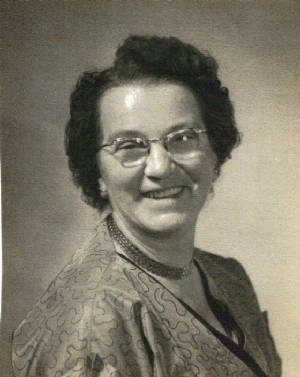
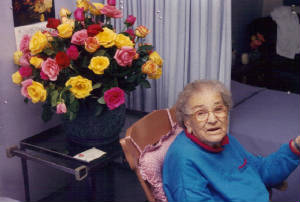
Edited interview with Fred Gale (FG), son of Alice Dugas and nephew of Anna Dugas. Interview conducted by Joe Manning (JM) on January 14, 2009.
JM: What did you think of the photos?
FG: I think they are wonderful. I recognized my mother right away.
JM: Why did the family moved to Norwich?
FG: I guess to work in the mills in the Taftville section. Two or three of my mother’s friends also came down from Winchendon.
JM: When did your mother stop working in the mills?
FG: I’m not sure, but she didn’t work while I was growing up.
JM: What did your father do for a living?
FG: He was a fireman for long time. About 1948 or 1949, there was a fire at the state hospital (Norwich State Hospital). He was the driver for the fire truck. He was supposed to stay with the truck, but the fellow with him wouldn’t go fight the fire, so my father did instead, and he got blown out of a window. My mother told him, ‘You’ve been to your last fire.’ So he went to work at the post office, as a janitor on the night shift.
JM: Did your mother ever go back to work when she was older?
FG: Not in the mills. But she did sell Stanley Home Products. She would go into other people’s houses to sell them.
JM: What was she like?
FG: She never had a bad thing to say about anybody. She was a generous person, even though we didn’t have much.
JM: Did your parents own the house where you grew up?
FG: Yes. My grandmother made the down payment on the house for them. It was a three-family. At least half the time, people wouldn’t pay the rent. We were lucky to have two grocery stores within two blocks, and both managers carried people from week to week. So my mother would go in on Saturdays and make a payment.
JM: How long did your mother live in the house?
FG: When my father died, she couldn’t keep it up. I had bought a building in Norwich, and there was a three-room apartment available. So she sold the house and moved in.
JM: What was the address of your mother’s house?
FG: It was at 24 Coit St. Every so often, I drive by it, and it looks the same. It even has the same roof that I used to go up and maintain. It was a nice place. My father always kept it up. And he appreciated a clean car and a well-cut lawn.
JM: Did your mother have things she liked to do for recreation?
FG: She was a card player. She liked pinochle. She would go to other people’s houses to play. And sometimes the neighbors on the second floor would come downstairs to play.
JM: Did your mother have any special talents?
FG: She was a very fine cook. She could make stuff out of nothing. She canned peaches and pears. We had four pear trees in the yard. We would go blueberry picking a couple of times a year, and she would can them.
JM: Did she speak French?
FG: Yes, but never at home. When we went to see my grandmother, I was completely lost. I spoke no French at all. When my mother was older, she used to occasionally get letters in French from people in Winchendon or Montreal. She had relatives in Quebec. By that time, she had forgotten much of her French, so she would take the letters to my Aunt Anna to read. She went to school longer than my mother did.
JM: How far did she get in school?
FG: The sixth grade.
JM: How many children did your mother have?
FG: Just the three of us.
JM: What did you do for a living?
FG: I was a photographer. I worked freelance for a while, and then I went to work for the government, for a research agency, and worked in the photo lab.
JM: How did you get interested in photography?
FG: When I was in Europe during the Korean War, I bought a good camera.
JM: Did you or any of your siblings go to college?
FG: No.
JM: What was your Aunt Anna like?
FG: She was just like my mother. They had nice dispositions and were good, churchgoing people. Aunt Anna was a bingo player. If there was a bingo game anywhere within a mile or two of her house, she would be there.
JM: Were your mother and Anna close?
FG: Oh, yes. My mother’s mother lived in a three-family house on the second floor, and Aunt Anna lived on the third floor. We always went to see Grandma and Aunt Anna on Sundays.
JM: What was your grandmother like?
FG: She spoke only French, so I didn’t talk to her very much. But she got it across to you when it was time to wash your hands and sit down to eat. We would get there around noon and have lunch, and we would try to get home in time to listen to The Shadow on the radio.
JM: Your mother lived to be 98.
FG: All the Dugases lived a long time, except one, but he was a heavy smoker.
JM: Your mother lived for 38 years after your father died.
FG: But she had a very good life. She loved people. We left a car for her outside her apartment, even when she couldn’t drive anymore, so she could go down and sit in the car in the sun and talk to anyone who walked by. And that’s what she did.
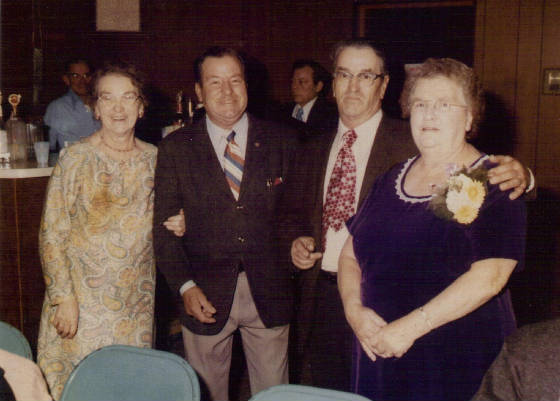
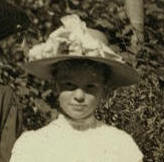
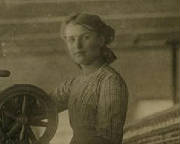
Alice Dugas: 1900-1998
Anna Dugas: 1897-1992
*Story published in 2010.
